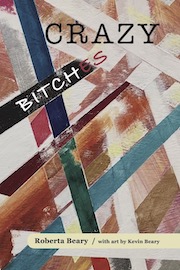
|
||
|
|
|
| Issue 27: | March 2025 |
| Nonfiction: | 497 words |
By Katie Dozier
Review of Crazy Bitches by Roberta Beary [they/she]
| Rarely does a book of poetry take Emily Dickinson’s advice to “[t]ell all the truth but tell it slant”[1] to such a level of illumination as Roberta Beary does with her latest collection, Crazy Bitches. Through the vehicle of the haibun form, and the sparks between the title, body, and haiku (which Beary, and her co-authors Lew Watts and Rich Youmans, wrote about in Haibun: A Writer’s Guide), reading Crazy Bitches is akin to watching spectacular, multi-colored light slant to the ground underneath a stained glass window. Beary gets to the root of many different traumas, which are made more accessible thanks to her mastery of the power of the haibun form. The subtlety of their haiku allows ample space for readers to thread the |
 Paintings by Kevin Beary Released by MacQ 8 March 2025 80 haibun 130 pp. |
needle of the story themselves. That balance of interweaving a resonant narrative while allowing readers to have the satisfaction of making the connections themselves is perhaps the most difficult tightrope walk of all—when it comes to crafting excellent poetry. Beary manages an impressive feat—by nestling the audience right alongside the various voices of the poems as the haiku allow for the space for the readers to make their own connections. Perhaps it is this all-too-rare synergy that caused Emily Dickinson to say, “If I feel physically as if the top of my head were taken off, I know that is poetry.”[2]
Beary is a master of intent, as is evidenced in the variations of voice and reimagining of the haibun form in Crazy Bitches. One such example is “Johnny Angel’s Last Dance (Up on the Rooftop),” which confronts the tragedy of suicide in the form of dance-step instructions. “Flying in from O’Hare” grants us the satisfaction of a full-circle narrative that is rarely seen in a form that is often so focused on leaps. Haibun is freshly seen as a form that is ripe for exploration as persona poems in Crazy Bitches, such as in “The Story of the Woman in the Poster,” about Virginia Woolf, which culminates with one of my favorite haiku of the entire collection:
riverwalk—
the white space
between words
One could make a case that “the white space / between words” is precisely what makes Crazy Bitches a book of such importance. It confronts topics as difficult to discuss as childhood abuse, but does so with the kind of reassuring, light hand that allows readers to reach great depth—including the opportunity for personal healing for the trauma survivors among us. With this book, Beary shows the multi-faceted light the haibun form can shine on us all.
1. First line of poem #1263, in The Poems of Emily Dickinson: Reading Edition (The Belknap Press of Harvard University Press, 1998).
2. From Dickinson’s letter to T. W. Higginson dated 16 August 1870, in The Letters of Emily Dickinson, edited by Thomas Johnson and Theodora V. Ward (The Belknap Press of Harvard University Press, 1958).
Katie Dozier’s
love of poetry first bloomed as a child. She memorized Robert Frost sitting on a tree stump and bathed in Edgar Allan Poe as an adolescent. While studying words at Florida State University, she played with chips and became a professional poker player. Her poetry has recently been published by Rattle, Frontier, and The Tickle. She is the author of Watering Can and co-author with Timothy Green of Hot Pink Moon: A Crown of Haibun.
Katie is also the founder and co-host of ThePoetrySpace_ weekly podcast; Associate Editor of Rattle and haiku editor of ONE ART: a journal of poetry; maintains TheNFTPoetryGallery.com as a vehicle for showing the potential of CryptoPoetry; and regularly speaks at NFT NYC conferences.
| Copyright © 2019-2025 by MacQueen’s Quinterly and by those whose works appear here. | |
| Logo and website designed and built by Clare MacQueen; copyrighted © 2019-2025. | |
|
Data collection, storage, assimilation, or interpretation of this publication, in whole or in part, for the purpose of AI training are expressly forbidden, no exceptions. |
At MacQ, we take your privacy seriously. We do not collect, sell, rent, or exchange your name and email address, or any other information about you, to third parties for marketing purposes. When you contact us, we will use your name and email address only in order to respond to your questions, comments, etc.